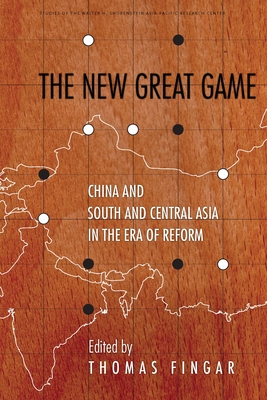

 Stanford University Press
Stanford University Press
The New Great Game: China and South and Central Asia in the Era of Reform


Key Metrics
- Thomas Fingar
- Stanford University Press
- Hardcover
- 9780804796040
- 9.1 X 5.9 X 1 inches
- 1.35 pounds
- Political Science > International Relations - General
- English
 Secure Transaction
Secure TransactionBook Description
China's rise has elicited envy, admiration, and fear among its neighbors. Although much has been written about this, previous coverage portrays events as determined almost entirely by Beijing. Such accounts minimize or ignore the other side of the equation: namely, what individuals, corporate actors, and governments in other countries do to attract, shape, exploit, or deflect Chinese involvement. The New Great Game analyzes and explains how Chinese policies and priorities interact with the goals and actions of other countries in the region.
To explore the reciprocal nature of relations between China and countries in South and Central Asia, The New Great Game employs numerous policy-relevant lenses: geography, culture, history, resource endowments, and levels of development. This volume seeks to discover what has happened during the three decades of China's rise and why it happened as it did, with the goal of deeper understanding of Chinese and other national priorities and policies and of discerning patterns among countries and issues.
Author Bio
Thomas Fingar is a Shorenstein APARC Fellow in the Freeman Spogli Institute for International Studies at Stanford University. He was the inaugural Oksenberg-Rohlen Distinguished Fellow from 2010 through 2015 and the Payne Distinguished Lecturer at Stanford in 2009.
From 2005 through 2008, he served as the first deputy director of national intelligence for analysis and, concurrently, as chairman of the National Intelligence Council. Fingar served previously as assistant secretary of the State Department’s Bureau of Intelligence and Research (2000-01 and 2004-05), principal deputy assistant secretary (2001-03), deputy assistant secretary for analysis (1994-2000), director of the Office of Analysis for East Asia and the Pacific (1989-94), and chief of the China Division (1986-89).
Between 1975 and 1986 he held a number of positions at Stanford University, including senior research associate in the Center for International Security and Arms Control.
Fingar is a graduate of Cornell University (A.B. in Government and History, 1968), and Stanford University (M.A., 1969 and Ph.D., 1977 both in political science). His most recent books are From Mandate to Blueprint: Lessons from Intelligence Reform (Stanford University Press, 2021), Reducing Uncertainty: Intelligence Analysis and National Security (Stanford University Press, 2011), The New Great Game: China and South and Central Asia in the Era of Reform, editor (Stanford University Press, 2016), Uneasy Partnerships: China and Japan, the Koreas, and Russia in the Era of Reform (Stanford, 2017), and Fateful Decisions: Choices that will Shape China’s Future, co-edited with Jean Oi (Stanford, 2020).
His most recent article is, "The Role of Intelligence in Countering Illicit Nuclear-Related Procurement,” in Matthew Bunn, Martin B. Malin, William C. Potter, and Leonard S Spector, eds., Preventing Black Market Trade in Nuclear Technology (Cambridge, 2018)."
Dr. Fingar is currently researching China and the World.
Source: Stanford University Freeman Spogli Institute for International Studies
Videos
No Videos
Community reviews
Write a ReviewNo Community reviews